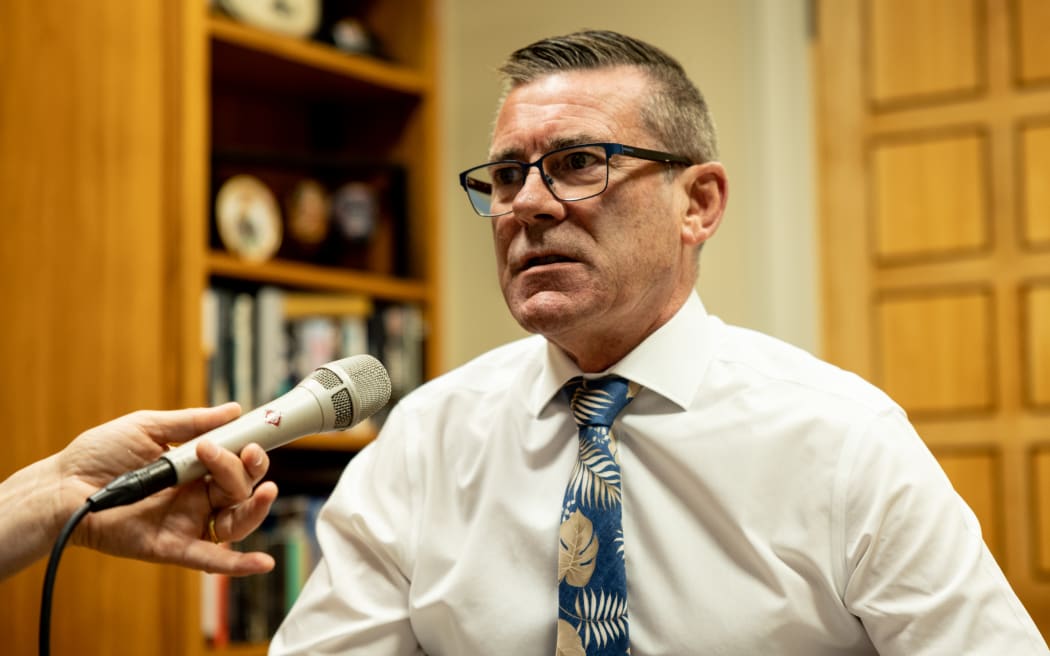This week in Parliament, there’s a fruity mix of debate on areas ranging from a key police scrutiny role and annual reviews to two bills about booze, capped by the highly anticipated farewell speech from a familiar face.
It’s Member’s Week at Parliament, where on Wednesday MPs will debate those Member’s Bills lucky enough to have been picked from the Biscuit Tin. The Shadow Leader of the House, National’s Michael Woodhouse, spoke to The House about what’s interesting this week, beginning with discussion on today’s Parliamentary Motion to appoint a new chairperson of the Independent Police Conduct Authority (IPCA).

National MP Michael Woodhouse, the Shadow Leader of the House. Photo: Johnny Blades / VNP
Police scrutiny role
Parliament approved the IPCA appointment unanimously. And while the Business Committee agreed there could be a debate of up to two hours on that motion, the sum total of the five speeches (one from each party) came to little over twenty minutes. But Woodhouse said the IPCA role's importance justified the attention of Parliament.
“This is a really important constitutional convention that while the police are nominally a branch of the Executive they have to be independent. And we’ve seen very recent examples of where the potential for political interference in the decision-making of police can have quite significant consequences," Woodhouse said.
“The Policing Act has a section in it which prevents not just the Minister but any Member of Parliament attempting to interfere with police conduct. And that’s really important, but it also makes this role very important as well, the IPAC chair; it has to be a retired judge, so it’s somebody of significant standing in the community but also with a very significant body of knowledge in the legal process.”
Annual review debate
The committee stage of the Appropriation (2021/22 Confirmation & Validation) Bill - or in other words the annual review debate – the culmination of the entire budget process for the previous year – commenced today.
“This is a quite long debate. I think it’s about 13 or 15 hours long [ed. it’s now 10 hours]. And the standing select committees have been going through a process of reviewing government departments essentially, and they have to report back to the House by the 31st of March, following which is this debate,” Woodhouse explained, adding that the debate was “something of a set piece”.
“But the Government has been very accommodating to other parties in terms of doing its best to make sure that the ministers responsible for the appropriations that opposition parties are interested in are available.
“There’s a high level of correlation or overlap between the parties. We’re obviously interested in finance, health, education, social development, transport, immigration – this year definitely – and police. The Greens have added in housing and environment. So that’s a pretty exhaustive list of the appearances that we’ll see by the ministers over the next few weeks.”
Alcohol bills
Member’s bills that are relatively well progressed get priority over member’s bills which are yet to get a first reading. There are quite a few member’s bills already underway so there’s unlikely to be too many more new bills picked from the ballot before the House rises for the election.
“What’s interesting [this week] is that there are now two bills that are going to be conscience votes,” Woodhouse said, referring to National MP Ian McKelvie’s Sale and Supply of Alcohol (Exemption for Race Meetings) Amendment Bill and Green MP Chlöe Swarbrick’s Sale and Supply of Alcohol (Harm Minimisation) Amendment Bill.
The former bill provides an exemption from restrictions on alcohol consumption for racing clubs on the days of race meetings. The latter bill abolishes appeals on local alcohol policies in order to provide proper local control over alcohol regulation; and also implements a number of recommendations of the 2014 Ministerial Forum on Alcohol Advertising and Sponsorship.
Although the Shadow Leader of the House admitted that Swarbrick’s proposed legislation had good things in it – including the empowerment of local councils to regulate alcohol sale, on which he said “the Government also has a plan to fix that” – but said that there were things in the Bill that other parties wouldn’t be able to support. Woodhouse noted that Swarbrick’s Bill was “a bit of an omnibus bill” and expected that it probably wouldn’t pass its first reading, whereas McKelvie’s bill is well on track to become law.
“In my experience the more that’s put into a member’s bill the less likely it is to get the majority support in the House. Those that are more successful are bills like Ian McKelvie’s bill which was to tidy up something of an irritant in legislation, and it has the better chance of passing.”
Ardern’s farewell
On Wednesday at around 5:30pm, we’ll get to hear the valedictory statement of outgoing MP Jacinda Ardern, who resigned as Prime Minister only a couple of months ago, even if it feels like years. The galleries are sure to be packed for this farewell speech from the country’s most prominent politician of recent years.
Noting the largely empty opposition benches during the last valedictory statement of a major political figure in this Parliament (the former Speaker Trevor Mallard’s farewell late last year), The House asked Woodhouse if that was planned, curious as to whether we could expect another boycott of Ardern’s speech.
“There was no whipping on that. I can’t make any comments on the personal choices my colleagues made to attend. My personal view is that I try and attend all maidens and valedictories out of respect for those who are coming and going. I’ll certainly be able to attend this one, and I expect there to be a pretty full muster across the House for Jacinda Ardern’s valedictory.”

